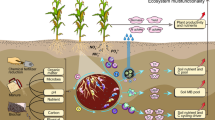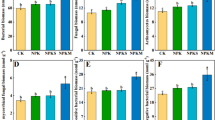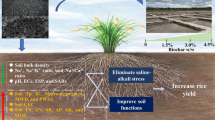Abstract
Aims
Potato starch wastewater contains higher contents of essential nutrients, which can be fertilizer to help crop growth. However, the effects of fermented potato fertilizer on soil ecology and microbial community structure have not yet been elucidated. This study aimed to investigate the shifts of active ammonia oxidation microbial communities under different fertilization in a typical soil in North China.
Methods
The different levels of fermented potato fertilizer without or with chemical fertilizer were designed by field experiment.
Results
The results showed that applying fermented potato fertilizer could significantly increase crop yields by 165–399% compared to Control. The content of available soil nutrients and the activity of saccharase and cellulase were increased when fermented potato fertilizer was applied, and the combination fertilizers further increased the content of Olsen-P by 145.6–166.7%, NO3− by 15.2–81.1%, Total C by 13.8–14%, and Total N by 27.2–34.7% compared with fermented potato fertilizer (PW) treatments. In addition the fermented potato fertilizer significantly stimulated the diversity of soil microbial community and increased the differentiation and stability of soil microbial networks in deep soils. Finally, the change of niche of soil Comammox (COM), ammonia-oxidizing archaea (AOA), and ammonia-oxidizing bacteria (AOB) were found after PW treatments. It showed a significant positive correlation between AOA and COM (r = 0.79, P < 0.01), AOB and NOB (r = 0.7, P < 0.05) instead of theoretically the competitive relationship between AOA and COM.
Conclusions
One of the reasons crop yield increase is that fermented potato fertilizer can modulate soil nitrification strategy bychanging the niche of soil functional microorganisms to increase fast-acting nutrients and increase crop yield.
Graphical abstract








Similar content being viewed by others
References
Abbas T, Zhang Q, Zou X, Tahir M, Wu D, Jin S, Di H (2020) Soil anammox and denitrification processes connected with N cycling genes co-supporting or contrasting under different water conditions. Environ Int 140. https://doi.org/10.1016/j.envint.2020.105757
Ali W, Nadeem M, Ashiq W, Zaeem M, Gilani SSM, Rajabi-Khamseh S, Pham TH, Kavanagh V, Thomas R, Cheema M (2019) The effects of organic and inorganic phosphorus amendments on the biochemical attributes and active microbial population of agriculture podzols following silage corn cultivation in boreal climate. Sci Rep 9:1–17. https://doi.org/10.1038/s41598-019-53906-8
Bae H-S, Morrison E, Chanton JP, Ogram A (2018) Methanogens are major contributors to nitrogen fixation in soils of the Florida Everglades. Appl Environ Microbiol 84. https://doi.org/10.1128/aem.02222-17
Bissey LL, Smith JL, Watts RJ (2006) Soil organic matter–hydrogen peroxide dynamics in the treatment of contaminated soils and groundwater using catalyzed H2O2 propagations (modified Fenton’s reagent). Water Res 40:2477–2484. https://doi.org/10.1016/j.watres.2006.05.009
Cai M, Hu C, Wang X, Zhao Y, Jia W, Sun X, Elyamine AM, Zhao X (2019) Selenium induces changes of rhizosphere bacterial characteristics and enzyme activities affecting chromium/selenium uptake by pak choi (Brassica campestris L. ssp. Chinensis Makino) in chromium contaminated soil. Environ Pollut 249:716–727. https://doi.org/10.1016/j.envpol.2019.03.079
Chevalier S, Bouffartigues E, Bodilis J, Maillot O, Lesouhaitier O, Feuilloley MG, Orange N, Dufour A, Cornelis P.J.F.m.r. (2017) Structure, function and regulation of Pseudomonas aeruginosa porins. FEMS Microbiol Rev 41:698–722. https://doi.org/10.1093/femsre/fux020
Cotto I, Dai Z, Huo L, Anderson CL, Vilardi KJ, Ijaz U, Khunjar W, Wilson C, De Clippeleir H, Gilmore K (2020) Long solids retention times and attached growth phase favor prevalence of comammox bacteria in nitrogen removal systems. Water Res 169:115268. https://doi.org/10.1016/j.watres.2019.115268
Daims H, Lebedeva EV, Pjevac P, Han P, Herbold C, Albertsen M, Jehmlich N, Palatinszky M, Vierheilig J, Bulaev A (2015) Complete nitrification by Nitrospira bacteria. Nature 528:504–509. https://doi.org/10.1038/nature16461
Fierer N, Lauber CL, Ramirez KS, Zaneveld J, Bradford MA, Knight R (2012) Comparative metagenomic, phylogenetic and physiological analyses of soil microbial communities across nitrogen gradients. ISME J 6:1007–1017. https://doi.org/10.1038/ismej.2011.159
Fontaine S, Bardoux G, Abbadie L, Mariotti AJEL (2010) Carbon input to soil may decrease soil carbon content. Ecol Lett 7:314–320. https://doi.org/10.1111/j.1461-0248.2004.00579.x
Jia Z, Conrad R (2009) Bacteria rather than Archaea dominate microbial ammonia oxidation in an agricultural soil. Environ Microbiol 11:1658–1671. https://doi.org/10.1111/j.1462-2920.2009.01891.x
Kakosová E, Hrabák P, Černík M, Novotný V, Czinnerová M, Trögl J, Popelka J, Kuráň P, Zoubková L, Vrtoch Ľ (2017) Effect of various chemical oxidation agents on soil microbial communities. Chem Eng J 314:257–265. https://doi.org/10.1016/j.cej.2016.12.065
Karigar C, Mahesh A, Nagenahalli M, Yun DJJB (2006) Phenol Degradation by Immobilized Cells of Arthrobacter citreus. Biodegradation 17:47–55. https://doi.org/10.1007/s10532-005-3048-y
Kaya C, Akram NA, Sürücü A, Ashraf M (2019) Alleviating effect of nitric oxide on oxidative stress and antioxidant defence system in pepper (Capsicum annuum L.) plants exposed to cadmium and lead toxicity applied separately or in combination. Sci Hortic 255:52–60. https://doi.org/10.1016/j.scienta.2019.05.029
Kim J-G, Park S-J, Damsté JSS, Schouten S, Rijpstra WIC, Jung M-Y, Kim S-J, Gwak J-H, Hong H, Si O-J (2016) Hydrogen peroxide detoxification is a key mechanism for growth of ammonia-oxidizing archaea. Proc Natl Acad Sci 113:7888–7893. https://doi.org/10.1073/pnas.1605501113
Kits KD, Sedlacek CJ, Lebedeva EV, Han P, Bulaev A, Pjevac P, Daebeler A, Romano S, Albertsen M, Stein LY (2017) Kinetic analysis of a complete nitrifier reveals an oligotrophic lifestyle. Nature 549:269–272. https://doi.org/10.1038/nature23679
Koch H, van Kessel MA, Lücker S (2019) Complete nitrification: insights into the ecophysiology of comammox Nitrospira. Appl Microbiol Biotechnol 103:177–189. https://doi.org/10.1007/s00253-018-9486-3
Kot AM, Pobiega K, Piwowarek K, Kieliszek M, Błażejak S, Gniewosz M, Lipińska E (2020) Biotechnological methods of management and utilization of potato industry waste—a review. Potato Research, 1-17. https://doi.org/10.1007/s11540-019-09449-6
Kurcz A, Błażejak S, Kot AM, Bzducha-Wróbel A (2016) Wykorzystanie odpadów pochodzących z przemysłu rolno-spożywczego do produkcji biomasy drożdży paszowych Candida utilis. Postępy Mikrobiologii 55:19–26
Leite MF, Pan Y, Bloem J, Ten Berge H, Kuramae EE (2017) Organic nitrogen rearranges both structure and activity of the soil-borne microbial seedbank. Sci Rep 7:1–11. https://doi.org/10.1038/srep42634
Li L-J, Zhu-Barker X, Ye R, Doane TA, Horwath WR (2018) Soil microbial biomass size and soil carbon influence the priming effect from carbon inputs depending on nitrogen availability. Soil Biol Biochem 119:41–49. https://doi.org/10.1016/j.soilbio.2018.01.003
Li W, Wang J, Li X, Wang S, Liu W, Shi S, Cao W (2019a) Nitrogen fertilizer regulates soil respiration by altering the organic carbon storage in root and topsoil in alpine meadow of the north-eastern Qinghai-Tibet Plateau. Sci Rep 9:1–13. https://doi.org/10.1038/s41598-019-50142-y
Li Y, Fang F, Wei J, Wu X, Cui R, Li G, Zheng F, Tan D (2019b) Humic acid fertilizer improved soil properties and soil microbial diversity of continuous cropping peanut: a three-year experiment. Sci Rep 9:1–9. https://doi.org/10.1038/s41598-019-48620-4
Liang J, Zhou Z, Huo C, Shi Z, Cole JR, Huang L, Konstantinidis KT, Li X, Liu B, Luo Z (2018) More replenishment than priming loss of soil organic carbon with additional carbon input. Nat Commun 9:1–9. https://doi.org/10.1038/s41467-018-05667-7
Liu H, Li J, Zhao Y, Xie K, Tang X, Wang S, Li Z, Liao Y, Xu J, Di H (2018) Ammonia oxidizers and nitrite-oxidizing bacteria respond differently to long-term manure application in four paddy soils of south of China. Sci Total Environ 633:641–648. https://doi.org/10.1016/j.scitotenv.2018.03.108
Liu Y, Fan X, Zhang T, He W, Song F (2020a) Effects of the long-term application of atrazine on soil enzyme activity and bacterial community structure in farmlands in China. Environ Pollut 262:114264. https://doi.org/10.1016/j.envpol.2020.114264
Liu Z, Zhang C, Wei Q, Zhang S, Quan Z, Li M (2020b) Temperature and salinity drive comammox community composition in mangrove ecosystems across southeastern China. Sci Total Environ 742:140456. https://doi.org/10.1016/j.scitotenv.2020.140456
Markiewicz M, Przewodowska A, Przewodowski W, Stochła W, nad Środowiskiem CB, IHAR–PIB ZN (2015) Wykorzystanie chromatografii membranowej do odzyskiwania białek aktywnych biologicznie z odpadów przemysłu skrobiowego. Annual Set The Environment Protection Rocznik Ochrona Srodowiska 17, 1699-1714
Mehnaz KR, Corneo PE, Keitel C, Dijkstra FA (2019) Carbon and phosphorus addition effects on microbial carbon use efficiency, soil organic matter priming, gross nitrogen mineralization and nitrous oxide emission from soil. Soil Biol Biochem 134:175–186. https://doi.org/10.1016/j.soilbio.2019.04.003
Miedzianka J, Pęksa A, Pokora M, Rytel E, Tajner-Czopek A, Kita A (2014) Improving the properties of fodder potato protein concentrate by enzymatic hydrolysis. Food Chem 159:512–518. https://doi.org/10.1016/j.foodchem.2014.03.054
Noll L, Zhang S, Wanek W (2019) Novel high-throughput approach to determine key processes of soil organic nitrogen cycling: gross protein depolymerization and microbial amino acid uptake. Soil Biol Biochem 130:73–81. https://doi.org/10.1016/j.soilbio.2018.12.005
Norton JM, Klotz MG, Stein LY, Arp DJ, Bottomley PJ, Chain PS, Hauser LJ, Land ML, Larimer FW, Shin MWJA, microbiology, e., (2008) Complete genome sequence of Nitrosospira multiformis, an ammonia-oxidizing bacterium from the soil environment. Appl Environ Microbiol 74:3559–3572. https://doi.org/10.1128/AEM.02722-07
Nunes-Alves C (2016) Microbial ecology: Do it yourself nitrification. Nat Rev Microbiol 14:61–61. https://doi.org/10.1038/nrmicro.2015.20
Prosser JI, Nicol GW (2008) Relative contributions of archaea and bacteria to aerobic ammonia oxidation in the environment. Environ Microbiol 10:2931–2941. https://doi.org/10.1111/j.1462-2920.2008.01775.x
Sakoula D, Koch H, Frank J, Jetten MS, Van Kessel MA, Lücker S (2020) Enrichment and physiological characterization of a novel comammox Nitrospira indicates ammonium inhibition of complete nitrification. ISME J, 1–15. https://doi.org/10.1038/s41396-020-00827-4
Santoro AE (2016) The do-it-all nitrifier. Science 351:342–343. https://doi.org/10.1126/science.aad9839
Santos P, Pinhal I, Rainey FA, Empadinhas N, Costa J, Fields B, Benson R, Veríssimo A, Da Costa MS (2003) Gamma-proteobacteria Aquicella lusitana gen. nov., sp. nov., and Aquicella siphonis sp. nov. infect protozoa and require activated charcoal for growth in laboratory media. Appl Environ Microbiol 69:6533–6540. https://doi.org/10.1128/AEM.69.11.6533-6540.2003
Sperfeld M, Rauschenbach C, Diekert G, Studenik SJWr (2018) Microbial community of a gasworks aquifer and identification of nitrate-reducing Azoarcus and Georgfuchsia as key players in BTEX degradation. 132, 146-157. https://doi.org/10.1016/j.watres.2017.12.040
Spieck E, Sass K, Keuter S, Hirschmann S, Spohn M, Indenbirken D, Kop LF, Lücker S, Giaveno A (2020) Defining culture conditions for the hidden nitrite-oxidizing bacterium Nitrolancea. Front. Microbiol 11:1522. https://doi.org/10.3389/fmicb.2020.01522
Tang H, Li C, Xiao X, Shi L, Cheng K, Wen L, Li W (2020) Effects of short-term manure nitrogen input on soil microbial community structure and diversity in a double-cropping paddy field of southern China. Sci Rep 10:1–9. https://doi.org/10.1038/s41598-020-70612-y
Van Kessel MA, Speth DR, Albertsen M, Nielsen PH, den Camp HJO, Kartal B, Jetten MS, Lücker S (2015) Complete nitrification by a single microorganism. Nature 528:555–559. https://doi.org/10.1038/nature16459
Wang R-M, Wang Y, Ma G-P, He Y-F, Zhao Y-Q (2009) Efficiency of porous burnt-coke carrier on treatment of potato starch wastewater with an anaerobic–aerobic bioreactor. Chem Eng J 148:35–40. https://doi.org/10.1016/j.cej.2008.07.028
Xu S, Wang B, Li Y, Jiang D, Zhou Y, Ding A, Zong Y, Ling X, Zhang S, Lu H (2020) Ubiquity, diversity, and activity of comammox Nitrospira in agricultural soils. Sci Total Environ 706:135684. https://doi.org/10.1016/j.scitotenv.2019.135684
Xue C, Zhang X, Zhu C, Zhao J, Zhu P, Peng C, Ling N, Shen Q (2016) Quantitative and compositional responses of ammonia-oxidizing archaea and bacteria to long-term field fertilization. Sci Rep 6:1–11. https://doi.org/10.1038/srep28981
Yu P, Tang X, Zhang A, Fan G, Liu S (2019) Responses of soil specific enzyme activities to short-term land use conversions in a salt-affected region, northeastern China. Sci Total Environ 687:939–945. https://doi.org/10.1016/j.scitotenv.2019.06.171
Zhang Q, Zhu L, Wang J, Xie H, Wang J, Wang F, Sun F (2014) Effects of fomesafen on soil enzyme activity, microbial population, and bacterial community composition. Environ Monit Assess 186:2801–2812. https://doi.org/10.1007/s10661-013-3581-9
Zhou H, Zhang Y, Zhang H, Li H (2020) Screening of a strain of degradable protein in potato starch juice and analysis of fermentation products. Food Ferment Ind, 1–12. https://doi.org/10.13995/j.cnki.11-1802/ts.025776
Acknowledgements
The authors gratefully acknowledge the financial support from the National Key Research and Development Program of China (2021YFD1700803), the Natural Science Foundation of Zhejiang Province (LZ21C030002), the Ningxia Key Research and Development Program (2019BBF02028) and the National Natural Science Foundation of China (41877044).
Author information
Authors and Affiliations
Corresponding author
Ethics declarations
Ethical approval
This article does not contain any experiments involving human participants or animals performed by any authors; thus, ethical approval is not necessary.
Conflict of interest
The authors declare no conflict of interest.
Additional information
Responsible Editor: Hans Lambers.
Publisher's Note
Springer Nature remains neutral with regard to jurisdictional claims in published maps and institutional affiliations.
Supplementary Information
Below is the link to the electronic supplementary material.
Rights and permissions
Springer Nature or its licensor holds exclusive rights to this article under a publishing agreement with the author(s) or other rightsholder(s); author self-archiving of the accepted manuscript version of this article is solely governed by the terms of such publishing agreement and applicable law.
About this article
Cite this article
Gong, L., Abbas, T., Wu, D. et al. Fermented potato fertilizer modulates soil nitrification by shifting the niche of functional microorganisms and increase yield in North China. Plant Soil 481, 111–126 (2022). https://doi.org/10.1007/s11104-022-05622-y
Received:
Accepted:
Published:
Issue Date:
DOI: https://doi.org/10.1007/s11104-022-05622-y




